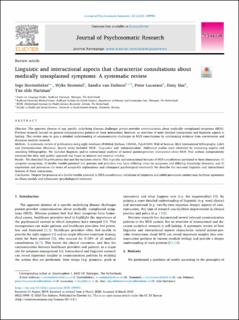Linguistic and interactional aspects that characterize consultations about medically unexplained symptoms: A systematic review
Stortenbeker, Inge; Stommel, Wyke; van Dulmen, Sandra; Lucassen, Peter; Das, Enny; Olde Hartman, Tim
Peer reviewed, Journal article
Published version
Permanent lenke
https://hdl.handle.net/11250/2735351Utgivelsesdato
2020Metadata
Vis full innførselSamlinger
Originalversjon
Stortenbeker, I., Stommel, W., van Dulmen, S., Lucassen, P., Das, E., & olde Hartman, T. (2020). Linguistic and interactional aspects that characterize consultations about medically unexplained symptoms: A systematic review. Journal of psychosomatic research, 132. https://doi.org/10.1016/j.jpsychores.2020.109994Sammendrag
Objective: The apparent absence of any specific underlying diseases challenges patient-provider communication about medically unexplained symptoms (MUS). Previous research focused on general communication patterns in these interactions; however, an overview of more detailed interactional and linguistic aspects is lacking. This review aims to gain a detailed understanding of communicative challenges in MUS consultations by synthesizing evidence from conversation and discourse analytic research. Methods: A systematic review of publications using eight databases (PubMed, Embase, CINAHL, PsychINFO, Web of Science, MLA International Bibliography, LLBA and Communication Abstracts). Search terms included ‘MUS’, ‘linguistics’ and ‘communication’. Additional studies were identified by contacting experts and searching bibliographies. We included linguistic and/or interactional analyses of natural patient-provider interactions about MUS. Two authors independently extracted the data, and quality appraisal was based on internal and external validity. Results: We identified 18 publications that met the inclusion criteria. The linguistic and interactional features of MUS consultations pertained to three dimensions: 1) symptom recognition, 2) double trouble potential (i.e. patients and providers may have differing views on symptoms and differing knowledge domains), and 3) negotiation and persuasion (in terms of acceptable explanations and subsequent psychological treatment). We describe the recurrent linguistic and interactional features of these interactions. Conclusions: Despite the presence of a double trouble potential in MUS consultations, validation of symptoms and subtle persuasive conduct may facilitate agreement on illness models and subsequent (psychological) treatment.

